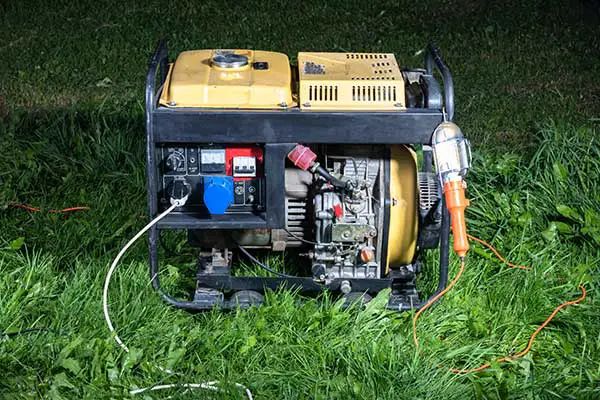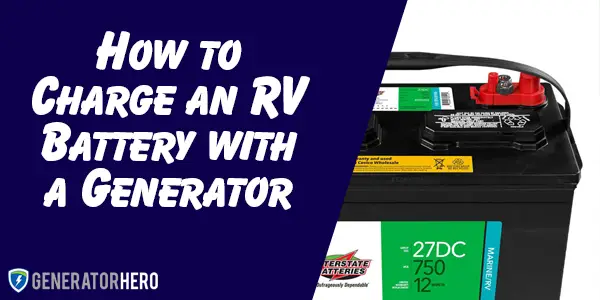It happens to every RV owner at some point. Your RV battery dies. Regardless of the cause, having a dead battery when you need it is frustrating. If you are in an isolated area without access to AC power to run a battery charger, there is hope. Your generator can power the battery charger to charge the battery!
The RV batteries’ purposes are to store electrical energy to power various aspects of the unit. Most motorized RVs have chassis batteries and house batteries. The chassis battery is also known as the starting battery. It is responsible for starting the engine on a motorhome. These are pretty much the same as automotive batteries, except they have a higher CCA (Cold Cranking Amps) rating to accommodate the larger engine.

The house batteries power 120V AC appliances and outlets throughout your RV. 120V AC power in an RV is available from one of three sources: shore power, generator power, or an inverter. The easiest option for powering the 120V AC system is plugging into shore power.
The most common reasons for an RV battery to die may be loose or corroded battery connections, persistent electrical drains, charging problems related to the inverter/converter, and cold weather. If your camper trailer battery is dead, check for corrosion, battery charge health, and converter issues. Your circuit board may have blown fuses, diodes, and resistors, or the shore power may be at fault. Proper maintenance of the batteries is the key to health.
Motorhomes with built-in generators need no additional hook-up to charge the batteries, as they are already wired to support the electrical system of the unit.
Charging your RV battery with your portable generator requires some basic information and tools. You will need to review your user’s manual for the proper steps to follow. In addition, make sure you know the type of battery and its size before attempting to charge it. RVs may be equipped with deep cycle batteries and/or standard batteries. Knowing the difference is important.
If your batteries are deep cycle, you will need to check the fluid levels in each cell and make sure they are full before attempting to charge. Fill them to the full mark (above the battery plates) with distilled water. Remove any corrosion from the top of the battery with a wire brush or other tool.
Make sure your generator is fueled and ready to work. Depending on the size of the battery and the battery charger you are using, it may need to run for a few hours to adequately charge the battery.
Safety is a good practice. Be sure to avoid physical contact with the battery fluids or corrosive materials. Wearing a pair of gloves and eye protection is a good idea.
You will need:
- A battery charger (10-amp trickle charge or triple stage)
- Portable generator
- A wire brush or other tool to clean the terminal points on the battery
5 Steps to Charge an RV Battery with a Generator
Step 1: Start the generator
Ensure that the generator is placed on a level surface and a few feet away from your RV. Start the generator and allow it to warm up. Allow the speed and voltage to stabilize before proceeding.
Step 2: Attach the battery charger
Attach the battery charger to the battery terminals using the alligator clips. The red alligator clip is attached to the positive terminal (+) on the battery. The black alligator clip is attached to the negative terminal (-) on the battery.
Step 3: Plug the charger into the generator
Plug the battery charger into the generator’s 120-volt outlet. Turn it on. Make sure that the battery charger is operating by inspecting its status lights. Review the battery charger instructions for monitoring the charger’s status to know when the rv battery is fully charged.
Step 4: Turn off the charger
Once the battery is charged you can turn off the charger, then unplug it from the generator. Disconnect the cables in the opposite order from which you attached them. The negative (black) clamp first, then the positive (red) clamp last. Your battery should be charged and ready to go.

FAQ
What size generator do I need to charge my RV batteries?
Typically, a small 600-watt and higher generator will be more than sufficient to run a 10-amp charger. A 2,000-watt generator is suggested for a triple stage charger.
Can you charge a deep cycle battery with a generator?
A deep cycle battery can be charged with a battery charger and a portable generator. Installed generators in motorhomes are directly wired through the electrical system and need no additional connections. Portable generators need to be connected via the battery charger. Note: ensure that the deep cycle battery fluids are topped off with distilled water before attempting to charge.
Why won’t my generator charge my RV battery?
There can be many reasons that a generator cannot charge an RV battery. If the generator is producing a low voltage output, the battery will take longer to charge.
When using an installed generator in the motor home, the connections between the generator and the electrical system may be detached or corroded.
If using a portable generator and battery charger, make sure all the connections are properly attached. Check the alligator clips (positive to positive, negative to negative), and the charger status lights to see if everything is working. If the battery is a deep cycle, it may be low on fluid and, therefore, overheating as it tries to recharge. The terminals on the battery may be corroded and not allowing the charge to enter.
The process can also be slowed if the temperature is below freezing.
Will a 2000-watt generator charge my RV batteries?
A 2000-watt generator produces enough voltage to sufficiently run a 10-amp battery charger or a triple stage charger.
How long does it take for a generator to charge RV batteries?
The length of time it takes will depend on the amount of charge needed to supply your battery to a full state. It also depends on the size of the battery charger. A 10-amp battery charger will take longer to “trickle charge” your battery than a 50-amp charger. If a battery is completely dead, using a 10-amp charger would take approximately 3-4 hours to charge.
The larger the charger, the less time it would take. Using a triple stage charger provides a higher charge rate for depleted batteries, a medium rate for low battery charges, and a float charge to maintain voltage in charged batteries.
Why is my RV battery draining so fast?
Batteries lose their energy from non-use. If your RV has been sitting idle for a period, chances are the batteries will need a boost charge.
Batteries lose their energy from non-use. If your RV has been sitting idle for a period, chances are the batteries will need a boost charge.
If you, however, have been using your RV and the battery power is draining, you need to check why.
The first is to check the deep cycle fluid levels in unsealed batteries. The battery cells should be filled to the mark above the battery plates in each cell. Make sure the terminals are clean of corrosive materials. This will stop energy flow into and out of the battery.
Another reason for an RV battery to drain quickly is the RV inverter/converter, a secondary source of power. Without it, the vehicle’s battery will be used as the source of energy. When the battery cells are used, they will quickly drain, meaning that the RV will lack the power to sustain itself and the appliances attached to it. An RV converter is used instead of the batteries because it has a longer life span and can handle large volts of electricity that are difficult for in house batteries.
How long should my RV batteries last?
With regular care and maintenance, RV batteries should last 5 to 7 years. When in use, RV batteries should be checked a minimum of every 30-days. Always disconnect batteries when the RV is in storage or sitting idle for long periods of time.
